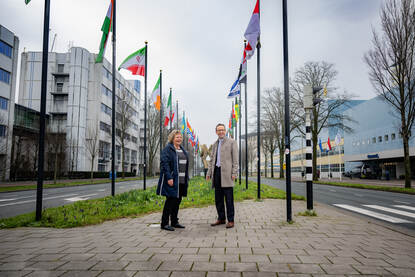Managing contracts for all our missions
The five-strong contract management team at the Financial Service Organisation (FSO) manages no less than 1,544 contracts for BZ worldwide. They check and manage lease agreements for buildings and other BZ contracts across the world. From France to Rwanda, from lease agreements for embassies and residences to procurement contracts for things like security, cleaning services and IT hardware.

‘Thanks to centralisation, we’re now working in a more streamlined way.’
‘In the past, I worked at the missions in Beijing, Buenos Aires, Moscow and Antwerp. Everything was done locally and, later on, regionally. The contracts themselves are the same but their management is different now that it’s been centralised. Back then, every embassy had its own contracts budget and accounts department. Today, we’ve got a more streamlined way of working,’ says team manager Marcha Fekkes.
Since processes have been centralised, the contracts for all the missions worldwide are managed from The Hague by Marcha, René van Leeuwen, Helen Hazenoot, Eray Aykanat and Parveen Jharihar. ‘The same BZ rules apply everywhere,’ says Marcha. ‘That was already the case, but centralisation means that everything is checked and approved at the ministry in The Hague, which ensures consistency.’

'The contracts for all our missions are managed by our five-strong contract management team'
Relieving the missions’ administrative burden
FSO Contract Management not only manages lease agreements for buildings. Around 25% of the team’s work involves checking and approving contracts for things like cleaning services, security, IT and garden maintenance services at the missions.
One mission that the team has a lot of contact with is the embassy in Washington, D.C.. Local employee Greetje Bouwhof has been working at this mission as accommodation officer since 2016. She finds working with the contract management team gives her peace of mind. ‘They work quickly, thoroughly and almost never make mistakes.’ For their part, Greetje and her colleagues do everything they can to make the contract management team’s work easier. ‘We follow the BZ rules closely and agree the rents and indexation for the years ahead in good time, so that the property owners can’t suddenly make huge increases. This also helps FSO know what to expect.’ Marcha certainly agrees that Greetje makes her team’s job easier, because she’s also quick and thorough in her approach. ‘Greetje follows the rules carefully and lets us know in good time if something is going to change, like indexation for example.’
Administrative officer for procurement Parveen says the following: ‘I work on lease agreements for buildings. If a mission concludes a new contract or wants to change something in an existing one, we register it and ensure that the money is paid. This also includes things like indexation of rent. We receive indexation updates via the Self Service Portal (SSP). We then draft the contracts accordingly. Rental deposits also fall within our remit.’

‘We agree the rents and indexation for the years ahead, so that the property owners can’t suddenly make huge increases.’

Diplomats’ clause
Contracts can vary per country, says Marcha. Take France, for example. ‘There, you’ll only get the owner of a property to sign once the first payment has been made. Officially, we only accept contracts that have been signed by both parties. But sometimes, you have to make exceptions if local law dictates otherwise.’
There is one thing the team don’t make an exception for and that’s the diplomats’ clause, which is in every lease agreement BZ concludes abroad. ‘The clause allows a lease agreement to be broken if diplomatic relations between the Netherlands and the country in question are severed.’ This is the same reason that FSO never pays rent more than one month in advance. ‘We know that in some countries, property owners want six months’ or a whole year’s rent in one go. That’s not something we support. Imagine the occupant leaves earlier than planned due to the diplomats’ clause being triggered. Then you’re left having paid a big chunk of money upfront.’
Back in Washington, Greetje remarks that sometimes it’s property owners who ask for the clause to be included in the agreement. ‘A lot of people living in Washington work for the US Department of State. If they’re posted abroad and rent out their home, they also want a diplomats’ clause in the agreement. But that’s not something we do. Because, if it were triggered, the occupant would have to leave the property at incredibly short notice.’
Presents from Tokyo
The contract management team have become experts in contracts in all countries, explains Parveen. ‘At the start, I used to read every contract through from beginning to end, using machine translation. Fortunately, we get everything sent to us in English as well as the original language.’ She’s noticed that she’s also started looking at contracts in her life outside work differently too. ‘When my aunt moved house, I went through the whole contract with a fine-tooth comb. That’s something I never did before I worked at FSO. Now I even check my phone contract.’ It’s not often you find something odd, however. ‘The contracts are, by and large, all very similar.’
For Parveen, working with the missions is the nicest part of her job. ‘Making our colleagues happy is also what makes me happy. The mission in Tokyo even sent a surprise package of Japanese sweets as a thank you for all our help. That was a lovely gesture.’ Marcha emphasises that FSO Contract Management really works as a team. ‘That’s why missions have to submit all their questions and changes via SSP or by email to our team inbox. That way, we can always work as a team to help them, and nothing comes down to just one person.’
Read more about the Financial Service Organisation (FSO):
- FSO Plaza - Missions - home (buzaservices.nl) ( accessible to Central Government employees only)










